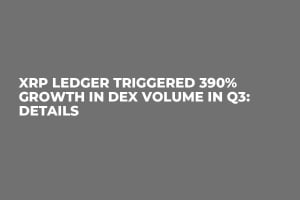
Disclaimer: The opinions expressed by our writers are their own and do not represent the views of U.Today. The financial and market information provided on U.Today is intended for informational purposes only. U.Today is not liable for any financial losses incurred while trading cryptocurrencies. Conduct your own research by contacting financial experts before making any investment decisions. We believe that all content is accurate as of the date of publication, but certain offers mentioned may no longer be available.
XRP Ledger might be set to receive new functionality in the coming weeks as the "fixReducedOffersV1" amendment, which fixes a minor issue with DEX offers, gained support from over 80% of validators and has entered a two-week countdown period.
If the upvotes exceed 80% for two weeks, fixReducedOffersV1 will be enabled.
As reported, the XRP Ledger (rippled server) version 1.12.0 was released in September.
Version 1.12.0 of rippled, the reference server implementation of the XRP Ledger protocol, introduced new functionality as well as three new amendments: AMM, Clawback and fixReducedOffersV1.
Out of these three amendments, the fixReducedOffersV1 amendment has achieved a majority, scoring 82.86% in consensus to enter a 14-day activation countdown period.
XRP Ledger's amendment process only allows protocol changes after two weeks of more than 80% validator support.
As a result, XRPL node operators are recommended to upgrade to the newest version, 1.12.0, as they risk being amendment-blocked if this is not done.
FixReducedOffersV1 is expected to provide a much-needed fix to XRPL as it minimizes the occurrence of order books blocked by reduced offers.
With this amendment, the exchange rate of a reduced offer is rounded such that it is as good as or better than the original offer (from the taker's perspective). This enables the reduced offer to be devoured by offers matching the original, full quantities. The rounded sum is no more than one XRP drop.
Without this amendment, an offer with extremely tiny sums remaining may have a substantially poorer exchange rate after rounding than it had before. This can lead to a very tiny offer "blocking" better offers in the same order book from being accepted.


 Alex Dovbnya
Alex Dovbnya Caroline Amosun
Caroline Amosun Tomiwabold Olajide
Tomiwabold Olajide